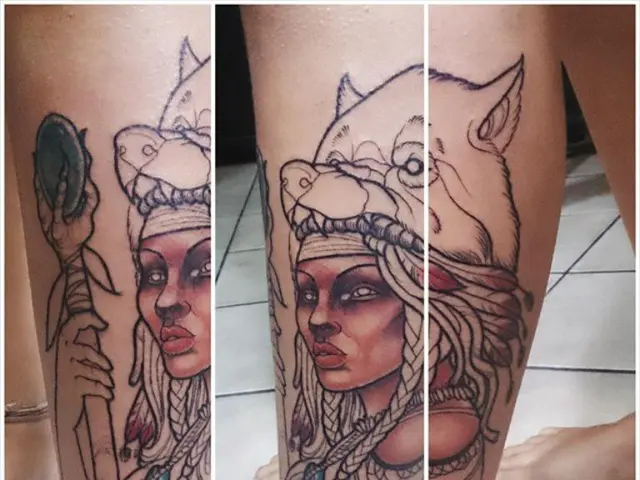Former German national football player Lina Magull discloses her struggle with depression
Article: Unveiling the Hidden Struggle: Ex-FC Bayern Captain Lina Magull Opens Up About Her Battle with Depression
Facebook Twitter Whatsapp E-Mail Print Copy Link
Former vice-European champion Lina Magull, now playing for Inter Milan, has revealed her personal battle with depression, a struggle that touched one of German football's most successful athletes. Despite her cheerful demeanor, Magull's internal turmoil often went unnoticed.
Smiles and Struggles
Always ready with a smile and a joke, Magull masked her darker moments. The footballer confessed to the podcast "Wie geht's" with her teammate Robin Gosens and moderator Nils Straatmann that her depression was so severe she eventually sought professional help. Her illness even led her to spend weeks in a clinic.
Initially, Magull didn't understand what was happening to her. "I thought I'd become some kind of weird person," she says. "I didn't want to admit that I might be mentally ill. That it's depression. No one wanted to name it." Fear and denial seemed to be the norm, not just for her, but for those around her too.
Clinic Stays and Turning Points
The turning point came when Magull's thoughts became so extreme that she saw no meaning in life anymore. Seeking help was difficult for her because "I'm actually such a cheerful person." Eventually, she sought help in a clinic in the summer of 2024. After two weeks, she accepted her diagnosis and began to improve.
Magull's recovery was so impressive that she was able to return to football shortly after. Inter Milan supported her, and she was reintegrated into the team two weeks before the first season game. She quickly found her footing again, as Inter Milan went on to become vice-champion behind Juventus Turin that season, earning them a spot in the coveted Champions League.
The Role's Weight and Personal Turbulence
Magull's mental strain started much earlier, dating back to 2018 when she moved from SC Freiburg to FC Bayern and became captain in 2020. The responsibilities of the captain's role took a toll on her, making her feel less free and more burdened. Adding to her stress, she was affected by private problems, her relationship breaking up along the way.
Easing the Burden: Help for Depression
If you suspect or are diagnosed with depression, it's vital to speak to a doctor or psychotherapist. In emergencies, such as suicidal thoughts, contact a psychiatric clinic immediately or call the emergency number 112. The Social Psychiatric Service usually provides local support, and the Info-Telephone Depression can be reached free of charge at 0800 - 33 44 533 on various days and times. Those in need can also find assistance from the Network for Mental Health and the Federal Association for Burnout and Depression e.V.
An Escape That Became an Accelerator
Eventually, Magull reached a point where football "no longer brought her any joy." She resigned as captain of FC Bayern and left the club last summer at her own request, moving to Milan. Her decision to leave, however, ended up accelerating her illness. "After a few weeks, I missed Munich terribly," she says, reflecting on her struggle.
Sleep problems, constant rumination, negativity, and panic attacks plagued Magull during her darkest days. She couldn't drive a car anymore and felt trapped, unsure what to do or where to go for help.
Embracing the Struggle
Eventually, Magull accepted that she needed professional help and spent six weeks in a clinic. Now, she looks back on her clinic stay with gratitude: "I'm really glad I was there."
FC Bayern MunichInter MilanDepressionFootballWomen's football
Insights
Professional athletes often face unique challenges when dealing with depression due to societal expectations and their profession. Common experiences include changes in performance, social withdrawal, and physical complaints, while potential risk factors include retirement from sport, anabolic steroid use, and sexual abuse victimization. Coping strategies include seeking professional help, fostering a supportive environment, raising awareness and education, and promoting healthy coping mechanisms. Diagnosing depression in athletes can be difficult due to overlapping symptoms with physical injuries or performance issues. The stigma associated with mental health issues remains a significant barrier for athletes seeking help.
- In light of Lina Magull's struggles, it might be beneficial to implement community policies that encourage vocational training and mental-health awareness in professional sports, especially women's football, to address the unique challenges athletes face and break the stigma surrounding mental-health issues.
- As part of her holistic approach to health and wellness, Magull underwent vocational training during her rehabilitation from depression, focusing on the science of mental health, potentially deepening her understanding and ability to help others who experience similar struggles.








